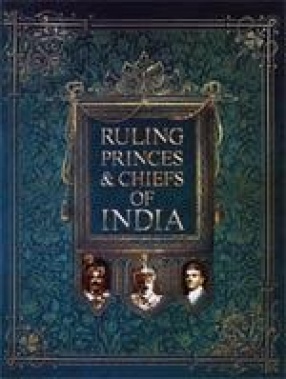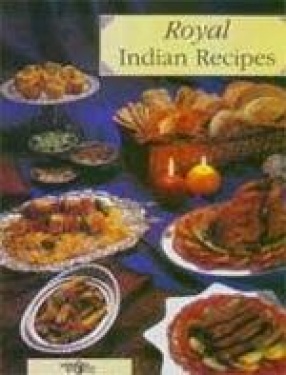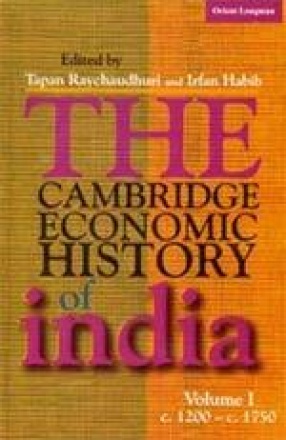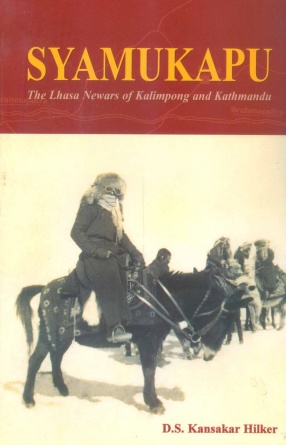Ruling Princes and Chiefs of India
Synopsis
It is well that the world should be told something of the Indian states, for the world knows very little about them, even less than it knows about British India. Like the good wife of the classics nothing is ever heard of these Indian states. It falls appropriately to the Times of India to undertake the task. Its pages and publications have already given the most vivid and well informed chronicles of important tours made through the states. Bombay, the gate of India, opens almost at once on the territory of the princes, and has thus a close and special interest in their present condition and future possibilities. These states enjoy a limited sovereignty under the suzerainty of the King-Emperor. The limitations are not irksome, and as a rule the interpretation of the treaties made with these states gives rise to few difficulties, for goodwill and consideration have usually characterized the relations of the rulers of the states with their Lord Paramount. Still it is right that the practice of the suzerain should be zealously watched for hitherto the states have been isolated, and a decision, which seems to affect only an individual state, may have far-reaching effects on all the states of India. For it may be used as a precedent, and so pass into that unwritten, yet fateful collection, which is known as "practice". Recently a committee has considered this subject, and it is thought that its findings will enhance the position, and strengthen the security of the Indian states. But in their own interests the princes should not insist on too precise a definition and stereotyped procedure, for the relations between the suzerain and his subordinate allies are often too delicate, and the circumstances too diverse to allow of rules of general application. In so many states there must be differences, yet there is a strange similarity between the various kingdoms in outlook, administration, standards of life, social atmosphere, and ceremonial. British India has in some of the larger cities and within limited and special groups shown signs of departing from the Indian type. The states have steadily adhered to type and run along on the old lines, which have come down the long centuries, lines followed by the Mughal emperors, lines which we might have followed leading to the federation of the various races into the United States of India, if only Lord Dalhousie had been content to keep British India one of the states, and had not insisted on dominance. The parting of ways may be seen in the lives of John and Henry Lawrence. The latter understood the Indians, because he loved them and had imagination. He would have governed India through its natural and hereditary leaders, men born and bred to rule. The former, who bad seen India through the eyes of a revenue officer, had no use for the middleman - the tall poppies to him were much the same as the poppies in a wheat-field are to the farmer. It was a pity, for when Orientals, even a minority, cease to be true to type, they become dangerous to Indian society, which is a very nicely-adjusted, delicate, complicated, and a somewhat static system. At this point may I present my credentials? When I was very young, impressionable - a kind of unbaked bureaucrat - I was put in charge of a little but very long district, which ran between two states of Rajputana, known respectively as the land of death, and the land of life. Always in camp the talk was of the advantages of our district and the lot of those who lived over the border. I had been told by a foreign secretary that no subject of British India would ever consent to being transferred to an Indian state, and of course I took for gospel any opinion our seniors announced. But my humble friends in Merwara - perhaps they were too primitive to be polite - seemed to think that there were advantages in the system of Indian states. It always came to this - life was too regularized, taxation too logical, arithmetical, and inevitable, and the perquisites too numerous in British India. Then visits to every state in Rajputana save Jaisalmir with its houses of exquisite tracery, made me acquainted with the Rajputs, great gentlemen. I noticed their beautiful manners, their noble outlook on life, and their respect for themselves, and for all who were respectable. Later during my 21 years in India I saw with pleasure that my admiration for Rajput chivalry and conduct was shared by the other states, and by the peoples of British India. They looked to Rajputana as the home of Hindu manners, as the shrine of Indian ideals of honour and courtesy. Throughout India they still cling to the beautiful dream of the golden age, and some day the great Indian social reformer will turn for inspiration, not to Europe, nor to America but to Rajputana and the other Indian States. I noticed too that in these states there were Indian officials of high ability and keen initiative. Many years later; when Lord Curzon was viceroy, he wanted Indians of mark to serve on commissions. He found them in the Indian states. For an Indian can only come to full stature, if he is in his own environment and in a society true to type. He must have a personal overlord, for the perfection of his labours and his loyalties. This can only be found in the Indian states, where the rule is personal, where the ruler knows his people, their language and their customs, and where every matter is settled by old usage and accepted tradition, of which he is the trusted and experienced custodian. Then in Lahore I knew well the representatives of the Punjab states, dignified men, who always thought first of the dignity of their chiefs, last and least of their financial interests. I met too the grand old men, who had been friends and advisers of Ranjit Singh, and had spoken their minds in the den of the famous Lion of the Punjab. They too talked of the dignity of power, and taught me that power comes from knowing men (admi shinasi). They were wits, masters of words, and conversation, but seemed asphyxiated by the cut and dried system of our administration. My conclusion is that, if I were a humble peasant, or an ambitious young Indian of fair education, I would rather live in an Indian State than in a British Province. In the long run it is better to be too little governed than to be too much governed and it makes life in the East more bearable if one knows the personality of one's governor. There is an Indian proverb, "If you live in a tank get on with your alligator." In an Indian state men may see their alligator daily, for the Durbar is open to all, who seek audience. In British India the Saurians swarm: they are hungry, and at times snappy. Men, who survey the world and discuss continents so easily, are apt to forget that this India, which contains one-fifth of the peoples of the earth, cares little for, and knows little of, the tendencies and the progresses of the others who live beyond the black water. But India cares greatly for the little things, which count, and its peoples so diverse one from another only ask to be left alone to their work, their hearth, and their dreams; they are happy if their brethren of the caste or the tribe play the game according to the rules. The average ruler of an Indian state cares also for the little things, and interest, hereditary instinct, and tradition impel him to insist on the rigour of the rules. There is more public opinion than there is in British India - real forceful opinion, which makes itself heard, and cannot be ignored by the ruler or by his officials. There is less litigation, less bureaucracy, and in consequence less opportunity for official underlings. There is less outward efficiency, less evidence of public works, but when the account is made up it may be hazarded that the peasant gets a bigger share of the results of his labour than his tribal brother, who lives in the next village across the border. And in comparing the two systems it is fair to remember that the great public works of British India, railways, irrigation, and roads, of which our countrymen may justly feel proud, owe their existence to capital borrowed from London. If the states had been given the same facilities, there would be another story to tell of their revenues, and their population. Still the land and the minerals are there, and finance will come, while the population seemingly small, side by side with the teeming swarms of British India, is absolutely large. It must be reckoned with what it lacks in quantity it makes up in quality, for the states are more homogeneous than are the huge, happy-go-lucky, agglomerations of nationalities, tribes and religions which are clamped together in the frame of a British province. The states are of a more convenient size, and composition, and so easier to govern. The Muslim lamb lies down by the Hindu lion, and the rulers of the states would frown, if communal riots were mentioned. There is something of the happy- family spirit in most of the states. The ruler is with his people for life, he is not a five-years bird of passage. He eats the same food, wears very much the same clothes, when he is off duty, knows their proverbs, and thinks the same thoughts. He belongs to them, he is "one of us". Sometimes, but very rarely a ruler comes who is idle or avaricious, and there is trouble. But it does not last long. There are remedies, sometimes swiftly applied. The Indian states must not be confused with the recent developments and discontents in British India, with the Simon Commission, and the threats of boycott and civil disobedience. They lie outside this whirlpool. They stand on their treaties, and whatever constitution the British Parliament may grant to British India, the treaties made with the states must be honourably fulfilled, even if this involved the maintenance of a British army in India for the purpose. The peculiar essence of the treaties is the guarantee of protection. The states are the most protected institutions in the world. But they have not relied entirely on this British protection. They have people, who are very virile, people who carry arms, and have not gone through the softening process, which has worked such change in British India. They stand across all the important routes of India. They have their own armies, and have often fought as gallant and effective allies side by side with the British forces. Fifty years ago there was a Patiala contingent helping us in the Afghan war.
Read more
288.90
260.01
$
321.00 $
Free delivery Wolrdwidе in 10-18 days
Ships in 3-5 days from New Delhi
Membership for 1 Year $35.00
Get it now and save 10%
Get it now and save 10%
BECOME A MEMBER










Bibliographic information